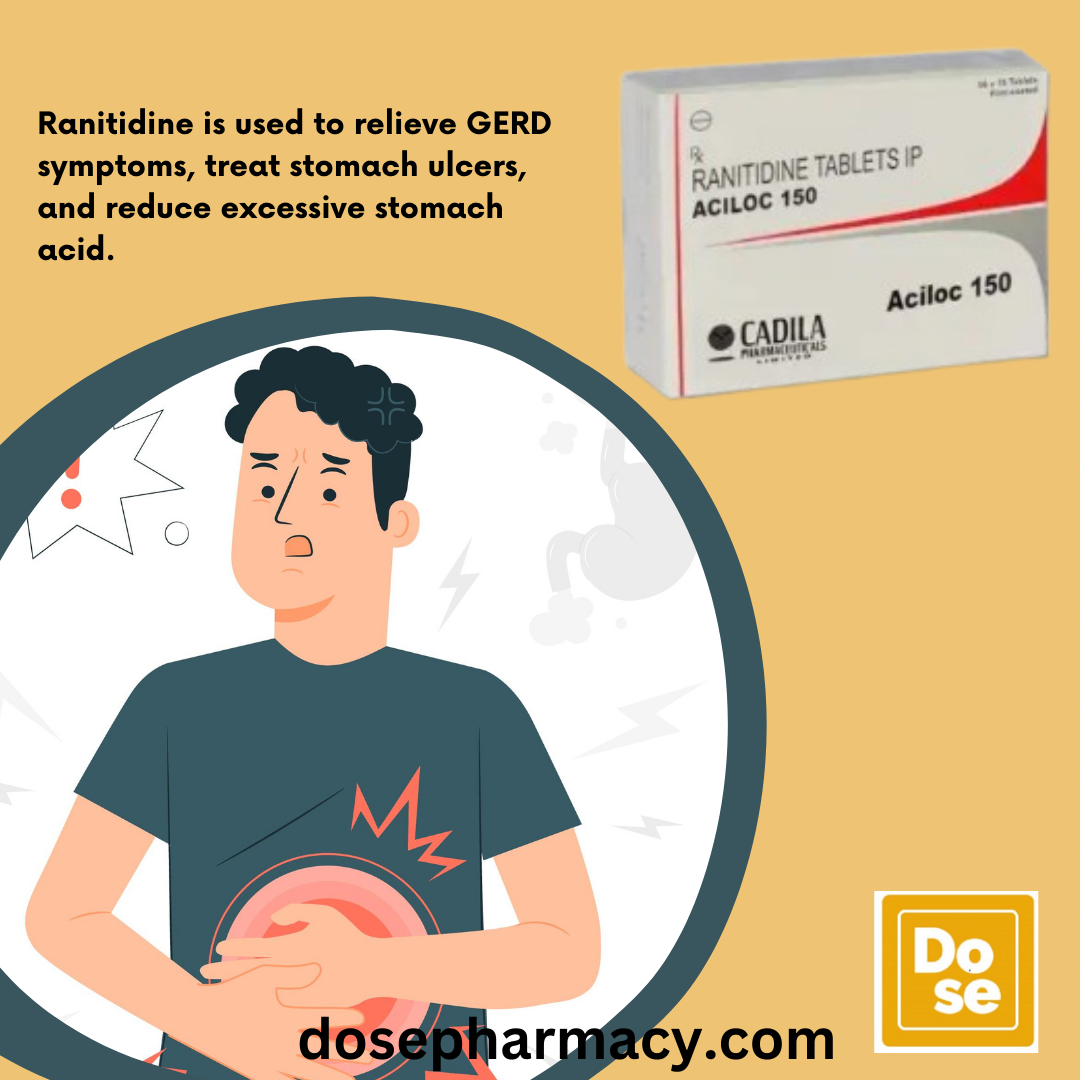The human digestive system is a marvel of biological engineering, capable of breaking down a wide array of foods into nutrients that fuel our bodies. However, like any complex system, it is susceptible to disruptions. Among the many issues that can arise, stomach ulcers stand out as both common and potentially serious. These open sores on the stomach lining can lead to significant discomfort and, if untreated, pose severe health risks. Ranitidine 150 mg is helpful in treating Stomach Ulcers. Understanding what causes stomach ulcers and exploring the available treatment options can empower individuals to take proactive steps toward maintaining their digestive health.
What Are Stomach Ulcers?
Stomach ulcers, or gastric ulcers, are a type of peptic ulcer disease (PUD) that develops when the protective lining of the stomach is compromised. The stomach’s lining produces mucus, which acts as a shield against corrosive stomach acid. When this barrier is eroded, acid can attack the underlying tissues, resulting in an ulcer.
Ulcers can vary in size and severity. Some might be small and asymptomatic, while others can cause significant pain and complications like bleeding or perforation of the stomach wall.
The Causes: Why Do Stomach Ulcers Develop?
1. Helicobacter pylori Infection
One of the primary causes of stomach ulcers is an infection with Helicobacter pylori (H. pylori), a type of bacteria. This microorganism thrives in the stomach’s acidic environment and can weaken the protective mucus layer, allowing acid to damage the stomach lining. The infection is common worldwide, often spreading through contaminated food, water, or close personal contact.
2. Excessive Use of NSAIDs
Nonsteroidal anti-inflammatory drugs (NSAIDs) like ibuprofen, aspirin, and naproxen are widely used for pain relief and inflammation. However, long-term or excessive use of these medications can inhibit the stomach’s ability to produce protective mucus, making the lining more vulnerable to acid attack.
3. Lifestyle Factors
While lifestyle alone rarely causes ulcers, certain habits can exacerbate the condition or increase susceptibility:
- Smoking: Tobacco can reduce the stomach’s ability to heal and increase acid production.
- Alcohol Consumption: Alcohol irritates the stomach lining and can worsen existing ulcers.
- Stress: Although not a direct cause, stress can aggravate symptoms and slow down the healing process.
4. Other Factors
- Zollinger-Ellison Syndrome: A rare condition where tumors in the pancreas or duodenum cause excessive acid production, leading to ulcers.
- Dietary Choices: While not a direct cause, spicy foods, acidic drinks, and caffeine can worsen ulcer symptoms.
Symptoms of Stomach Ulcers
Stomach ulcers can manifest in various ways, with some individuals experiencing mild symptoms and others suffering from severe discomfort. Common signs include:
- Burning Stomach Pain: A hallmark symptom, often felt between meals or at night.
- Nausea or Vomiting: Sometimes accompanied by blood, indicating a more severe ulcer.
- Loss of Appetite: Due to pain or discomfort after eating.
- Unexplained Weight Loss: A potential sign of complications.
- Bloating or Burping: Caused by excess gas in the stomach.
If left untreated, ulcers can lead to complications like internal bleeding, perforation of the stomach wall, or blockage of the digestive tract. These conditions require immediate medical attention.
Diagnosing Stomach Ulcers
To confirm the presence of a stomach ulcer, healthcare professionals may use one or more diagnostic tools:
- Endoscopy: A thin, flexible tube with a camera is inserted into the stomach to visually inspect the lining.
- Barium X-Ray: A special dye outlines the stomach in X-ray images, highlighting ulcers.
- H. pylori Tests: These include breath tests, stool tests, or blood tests to detect the bacteria.
Accurate diagnosis is crucial for determining the most effective treatment plan.
Treatment Options: Pathways to Healing
Fortunately, stomach ulcers are treatable, and most people recover fully with the right interventions. Treatment focuses on addressing the underlying cause, relieving symptoms, and preventing complications.
1. Medications
- Antibiotics: If H. pylori is detected, a combination of antibiotics is prescribed to eradicate the bacteria.
- Proton Pump Inhibitors (PPIs): Drugs like omeprazole and pantoprazole reduce stomach acid production, allowing the ulcer to heal.
- H2-Receptor Blockers: Buy ranitidine 150 mg online medications, such as ranitidine, decrease acid levels in the stomach.
- Antacids: Over-the-counter antacids provide quick relief by neutralizing stomach acid.
- Cytoprotective Agents: Medications like sucralfate help protect the stomach lining from further damage.
2. Lifestyle Modifications
Making simple yet effective changes can enhance treatment outcomes and reduce the risk of recurrence:
- Avoid NSAIDs: Switch to alternative pain relief options under medical guidance.
- Quit Smoking and Limit Alcohol: Both habits hinder the stomach’s healing process.
- Adopt a Balanced Diet: Focus on foods that soothe the stomach, like bananas, yogurt, and oatmeal, while avoiding irritants like caffeine and spicy foods.
- Manage Stress: Practices such as yoga, meditation, and regular exercise can help lower stress levels.
3. Surgical Intervention
In rare cases where ulcers fail to heal or lead to severe complications, surgery may be necessary. Procedures might include removing part of the stomach, repairing a perforated ulcer, or cutting the nerves that stimulate acid production.
Prevention: Staying One Step Ahead
While not all ulcers are preventable, certain strategies can minimize your risk:
- Practice good hygiene to reduce the likelihood of H. pylori infection.
- Use NSAIDs sparingly and always with food or a doctor-recommended protective medication.
- Maintain a healthy lifestyle with a balanced diet, regular exercise, and adequate stress management.
- Schedule regular check-ups, especially if you have a history of ulcers or gastrointestinal issues.
The Road to Recovery: Patience and Persistence
Recovering from a stomach ulcer is often a journey that requires commitment and patience. While medications can bring rapid relief, true healing takes time, and the lifestyle adjustments made during this period can lead to broader health benefits. By taking proactive steps and seeking medical guidance when needed, individuals can effectively manage ulcers and prevent future occurrences.
Final Thoughts: A Balanced Approach to Digestive Health
Stomach ulcers are more than just a nuisance; they are a reminder of the delicate balance our bodies maintain every day. Understanding the causes and treatments of ulcers can transform fear into empowerment, allowing you to make informed decisions about your health. Whether you’re dealing with a current ulcer or aiming to prevent one, knowledge is your strongest ally. Take the time to listen to your body, seek professional advice, and adopt habits that promote a healthier, ulcer-free life.
By addressing stomach ulcers head-on, you not only alleviate pain but also gain valuable insights into maintaining your overall well-being. Your digestive system works hard for you; it’s only fair to return the favor with care and attention




